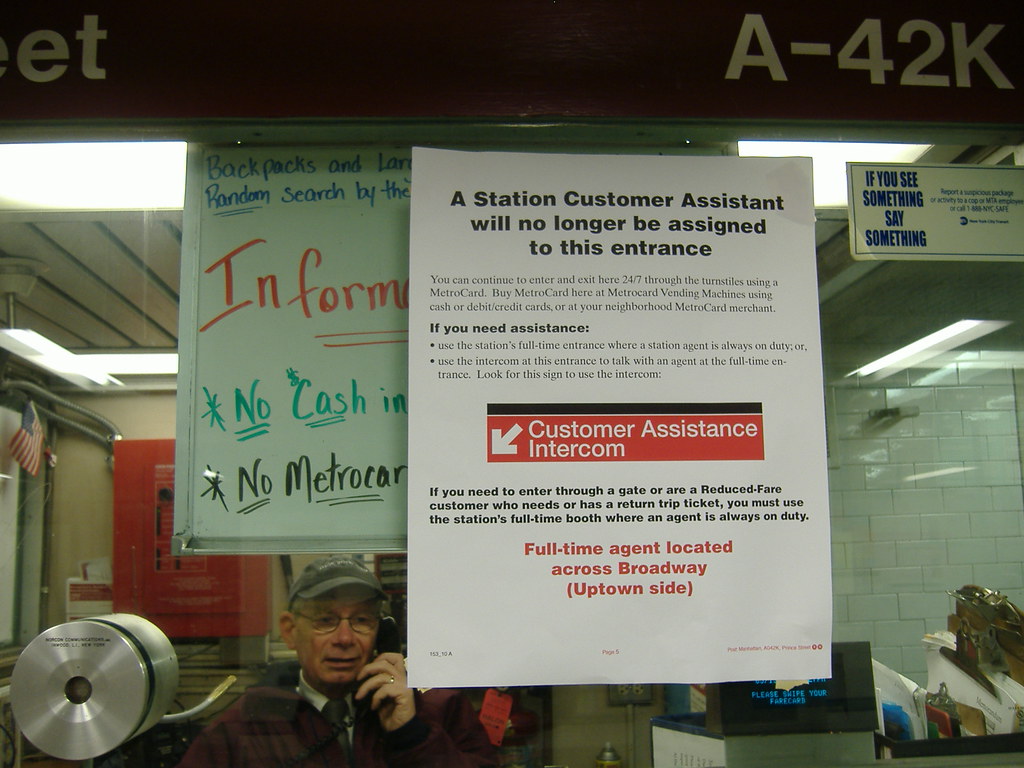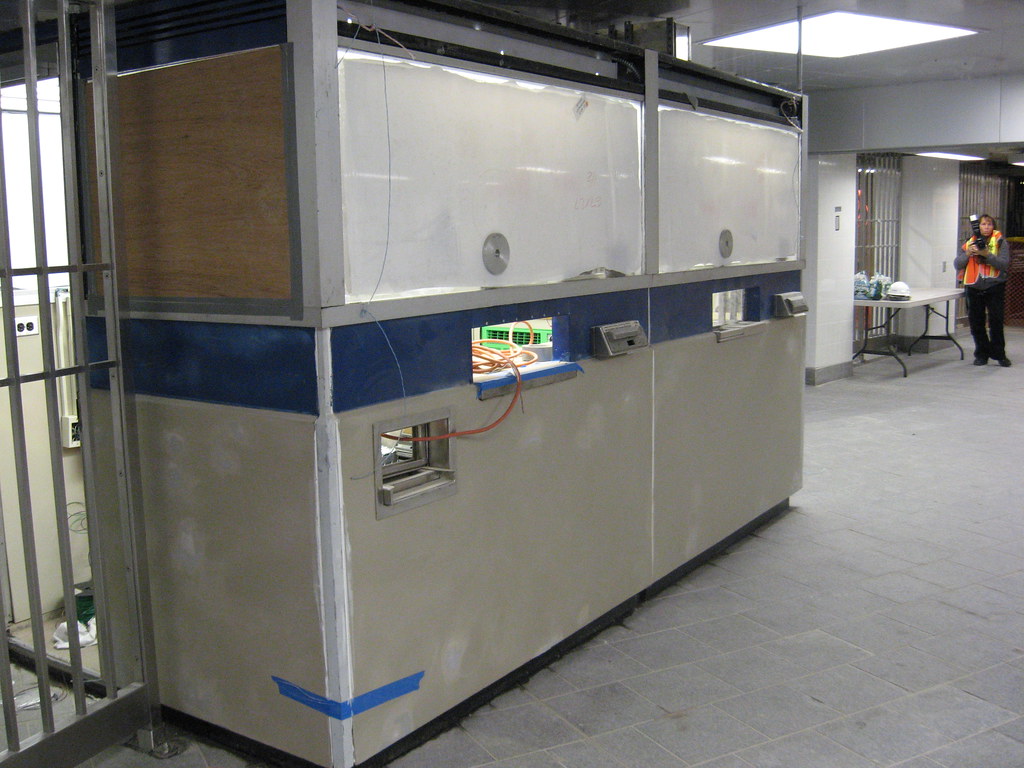Public Advocate Bill de Blasio calls upon the MTA to rehire its station agents during a rally last week. As a City Councilman, de Blasio did not support revenue-generating plans such as congestion pricing. (Photo via flickr user Public Advocate Bill de Blasio)
Not a day went by at the end of last week when the MTA did not find itself subjected to some sort of protest. First, the TWU and Public Advocate Bill de Blasio spoke out against station agent cuts. Then, Senator Chuck Schumer and labor leaders urged Congress to pass a $2 billion emergency transit operating aid relief bill. Finally, students at public schools throughout the city walked out on classes Friday to call upon city leaders to fund Student MetroCards. As the week ended, it became instantly clear who understand what was happening and who did not. The outcome is perhaps a bit surprising.
On the surface, the de Blasio-lead protest, pictured above, seemed genuine, but I believe his was the least effective and most indicative of political grandstanding. While ignoring the seeming reality of the MTA’s precarious fiscal position, de Blasio twisted the MTA’s economic reports to meet his political ends and issued statements that seemed to have little basis in fact.
“We cannot cut corners when it comes to straphangers’ safety,” de Blasio said. “New Yorkers who depend on station agents for security and essential services deserve a chance to have their voices heard. The MTA’s new public hearings will only work if they listen to New Yorkers and commit to incorporating their feedback before final decisions get made.”
His office’s press release touting the rally made sure to note that the MTA claims lost revenue due to fare-beating grew from $7 million to $20 million last year. Why? Because the MTA, he says, eliminated over 200 station agents. The Public Advocate fails to note that the MTA’s accounting methods changed as well. Perhaps the increase in fare-jumping — still a de minimis loss — was related to the axing of the agents, and perhaps, it was not. To draw that conclusion is unwarranted.
What de Blasio did not mention at his rally last week was his record on measures that would have provided the MTA with enough money to halt potential service cuts. As a City Council representative, de Blasio voted against congestion pricing because he feared it did not allow for enough additional transit options for his Brooklyn-based constituents. Now, we get service cuts and fewer station agents. Seems like a terrible trade-off to me.
Luckily, though, de Blasio wasn’t the only one raising a stink last week. A group of teenagers called upon the city to fund the Student MetroCard program. The kids left school, hopped on the subway and marched from City Hall to the MTA’s 370 Jay St. building to protest cuts to the free travel program, and as they did so, they targeted the politicians and not the MTA.
The politicians responded with words of support, but as City Council members and even Pedro Espada professed their desires to see student travel remain free, little progress has been made to shore up the program’s finances. Students, though, recognize that talking to politicians and not the MTA is the proper route. After all, the politicians are the ones who have stopped paying for this program, and the MTA isn’t a school bus operator. New York State and its municipalities foot the bill for student travel elsewhere; they should be doing the same in the city.
Finally, Senator Schumer and a group of transit labor leaders rallied in support of a federal measure that would deliver $2 billion nationwide to troubled transit agencies. The money probably won’t come from Washington until well after the MTA implements its service cuts, but as states dither on implementing tough funding schemes for their urban areas’ economic drivers, Washington may have to pick up the slack, albeit temporarily. As with the students, Schumer understands what needs to be done. He isn’t always the most vocal leader on transit matters, but if the money needs to come — if the pork has to flow — the state’s senior Senator has a way of delivering.
Yet, we shouldn’t have to rely on Schumer’s logrolling measures. We shouldn’t have to sit through Bill de Blasio’s public hypocrisy. We shouldn’t see this city’s students speaking out as lone voices of reason lost amidst bitter political debates. In two weeks, subway service will slow down. In two months, student rides may not be free. Neither of these outcomes are predestined, but as long as the city and state politicians we entrust to govern fail to do so, the millions of us who rely on transit will have to pay.


 I have such mixed thoughts about the future of the Student MetroCard program. On the one hand, students in New York City should enjoy free rides to and from their public schools as every other public school student in the country does. On the other hand, the city and state — and decidedly not the MTA — should be picking up the tab for this benefit. On other other, other hand, I have to wonder why Albany can get so up in arms when Student MetroCards are threatened but can’t be bothered to lift a finger when buses and subway routes are eliminated.
I have such mixed thoughts about the future of the Student MetroCard program. On the one hand, students in New York City should enjoy free rides to and from their public schools as every other public school student in the country does. On the other hand, the city and state — and decidedly not the MTA — should be picking up the tab for this benefit. On other other, other hand, I have to wonder why Albany can get so up in arms when Student MetroCards are threatened but can’t be bothered to lift a finger when buses and subway routes are eliminated.

 When residents who live along the M line from Bushwick to Middle Village wake up on June 27, they will find their commutes drastically altered. The M will no longer travel down Nassau St. and into Southern Brooklyn. Instead, with a new orange bullet denoting a Sixth Ave. trunk route, the M will take the Chrystie St. Cut to Broadway/Lafayette and make local stops up Sixth Ave. to Forest Hills. It is
When residents who live along the M line from Bushwick to Middle Village wake up on June 27, they will find their commutes drastically altered. The M will no longer travel down Nassau St. and into Southern Brooklyn. Instead, with a new orange bullet denoting a Sixth Ave. trunk route, the M will take the Chrystie St. Cut to Broadway/Lafayette and make local stops up Sixth Ave. to Forest Hills. It is 


 As the temporary restraining order preventing the MTA from firing 475 station agents remained in place throughout the weekend, the relationship between the authority and the TWU grew icier. Transit announced layoffs in spite of the injunction, and MTA Chair and CEO Jay Walder has engaged in a war of words with TWU President John Samuelsen over what Walder believes to be antiquated work rules hampering the authority.
As the temporary restraining order preventing the MTA from firing 475 station agents remained in place throughout the weekend, the relationship between the authority and the TWU grew icier. Transit announced layoffs in spite of the injunction, and MTA Chair and CEO Jay Walder has engaged in a war of words with TWU President John Samuelsen over what Walder believes to be antiquated work rules hampering the authority.